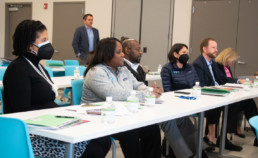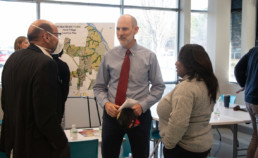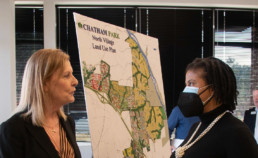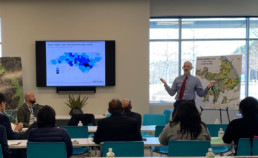Chatham County March 2021
Population
77,889
County Seat
Pittsboro
Median Income
$69,799
Population Density Designation
Rural
In Chatham County, we rolled through Pittsboro─the county seat─to Chatham Park, a live/work/play community that broke ground in 2014.
Currently around 5,000 residents call Pittsboro home, but Chatham Park is expected to increase that number by 60,000 over the next twenty years. That would represent an 80% increase of the county’s overall population, which today stands at just over 75,000 residents.
Joined by Dr. Lisa Chapman, President of Central Carolina Community College (CCCC), and Meghan Brown, Executive Director of College Access and Strategic Initiatives for CCCC, we heard about the plans for Chatham Park from Kirk Bradley, President and CEO of Lee-Moore Capital, and two representatives of Preston Development Company, Chuck Smith and Vanessa Jenkins.
Chatham Park is being built on more than 7,000 acres of land southwest of Jordan Lake in the central part of the state. With both residential and commercial components, this transformative development is similar in size to Research Triangle Park, just 30 miles northeast.
In response to the desires of potential home and business owners, Chatham Park will feature public parks instead of private amenities. Preston Development is currently constructing a facility that will house a new branch of the YMCA of the Triangle scheduled to open in 2024.
Following the Chatham Park presentation, we heard from several groups who serve community health needs─particularly the needs of Hispanic residents of Siler City. According to Dr. Luke Smith, Executive Director of El Futuro, Hispanic residents make up the largest proportion (30%) of uninsured people in North Carolina and are the most underserved for mental health services. El Futuro works to fill that gap by serving as a place where Spanish-speaking residents can access culturally responsive mental health services.
Hispanic residents have made up approximately half of Siler City’s population since 2000, and Dr. Smith hosted a panel of people working at organizations who serve them. The panel included Mike Zelek, Public Health Director of the Chatham County Public Health Department, Ilana Dubester, Executive Director & Founder of The Hispanic Liaison, Tych Cowdin, Executive Director of Communities in Schools for Chatham County and Angela Krider, Bilingual Integrated Behavioral Health Consultant at Piedmont Health Services.
While many Hispanic residents of Siler City have been there since the 1990s, panelists pointed out that people who are newly arrived in the United States have higher risk factors for negative health outcomes─they’re more likely to need medical care and less likely to be insured. Dr. Smith said that 70% of the people served by El Futuro are uninsured, and 30% use Medicaid. Krider’s patients are similar in that 60% are uninsured, and 25% use Medicaid.
Zelek stressed the importance of focusing on systemic drivers of population health in Chatham County, because “helping the people who are at higher risk for poor health outcomes helps everyone in the community lead healthier lives.”
Despite these challenges, Dubester pointed out that Chatham was the first county in North Carolina to eliminate the disparity in COVID-19 vaccination rates between Hispanic residents and the rest of the county’s population. She and the rest of the panel attributed this in part to the Hispanic Liaison supplying information in Spanish that is culturally appropriate─not just literally translated from English─so the messages resonate more clearly among the Hispanic community.

Meet Dr. Algie Gatewood
Dr. Algie Gatewood is only the fourth President to lead Alamance Community College (ACC) since it opened in 1958. During Dr. Gatewood’s tenure at ACC, the college won its largest ever bond referendum – nearly $40 million – in 2018 to fund a number of major capital projects and expansions. The college also secured $16 million in county funding in 2014 to build the Advanced Applied Technology Center. Other notable accomplishments include creating a Biotechnology Center of Excellence, introducing an Early College, facilitating an apprenticeship program, and introducing nearly two dozen new academic programs and articulation agreements with state universities.
U39702, 12/22






